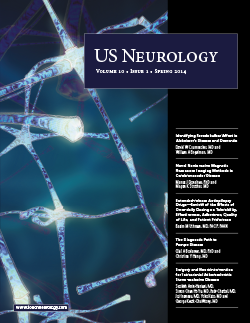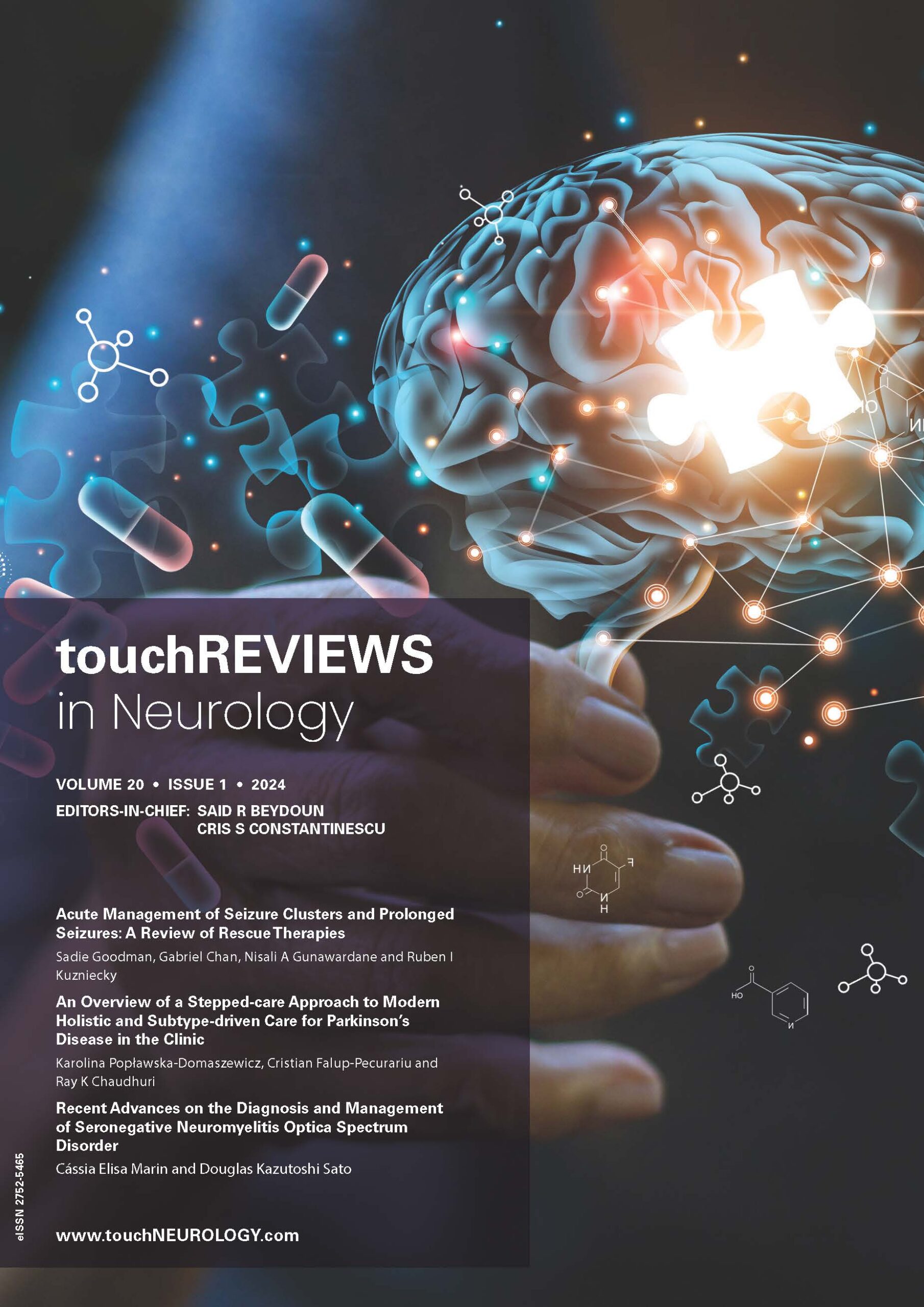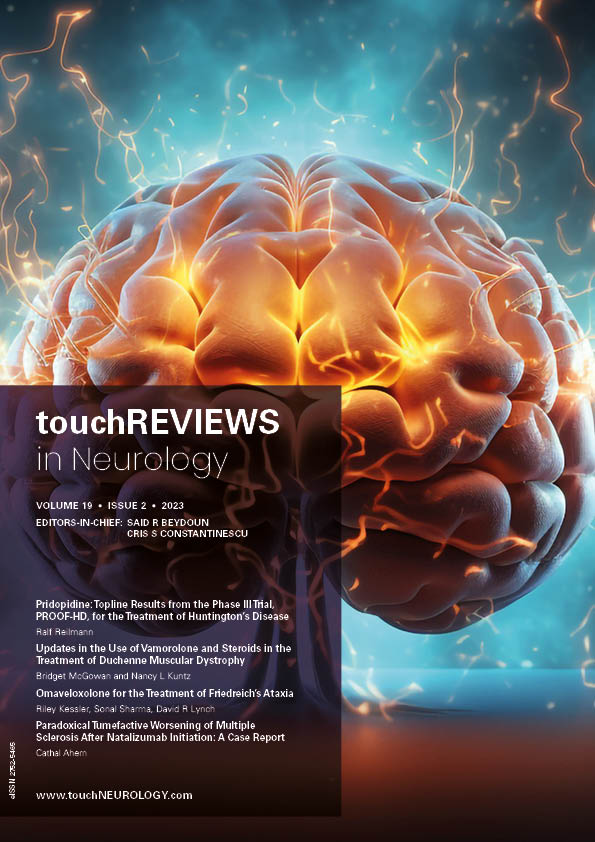US NEUROLOGY – VOLUME 10 ISSUE 1 – SPRING 2014
We are very pleased to present the spring edition of US Neurology. With an excellent foreword by Konstantin Slavin, MD, eagerly anticipating the imminent biennial congress of one of our valued media partners, the American Society for Stereotactic and Functional Neurosurgery (ASSFN), of which he is President, Dr Slavin’s foreword highlights one of the key qualities of our journal, “the multi-disciplinary collaboration within the field of neuroscience,” which is epitomised by the” variety of high-quality in-depth articles.” Neuroscience is comprised of many specialities and the topics featured in this edition showcase this; from epilepsy to stroke, neuro-oncology to movement disorders and surgery to imaging, this edition has much to peruse and enjoy.
This issue of US Neurology comes in time for the 2014 biannual conference of the American Society for Stereotactic and Functional Neurosurgery (ASSFN) in Washington, DC—the meeting that summarizes recent progress in our specialty and presents a wide overview of clinical and research advancements in the field of neurosurgical stereotaxis and functional neurosurgery. For those […]
Pseudobulbar Affect
An estimated 5.3 million people in the US have Alzheimer’s disease (AD),1,2 the incidence of which increases with age.3 Defined as a ‘progressive mental deterioration manifested by loss of memory, ability to calculate, and visual-spatial orientation, confusion and disorientation;’4 the symptoms, clinical presentation, and prognosis of AD are well known among clinicians. It is also […]
Restless Legs Syndrome
Restless legs syndrome (RLS) is a sensorimotor condition that primarily results in sleep disruption and subsequent daytime functional symptoms, particularly for those individuals with moderate-to-severe cases. In recent years there has been a shift from using the name ‘Restless Legs Syndrome’ to using ‘Willis–Ekbom Disorder’ (WED), in order to address matters of stigma and title […]
Stroke
Stroke is the leading cause of adult disability and the second leading cause of death in developed countries.1 Despite progress in stroke treatment, 20–30 % of strokes result in death within one month and 70–80 % result in significant long-term disability.2–4 Improved preventative and acute management of cerebrovascular disease has reduced stroke-related mortality;5 however, many […]
Epilepsy
Epilepsy is a chronic neurologic disorder characterized by recurrent episodes that may vastly affect health, daily functioning, and quality of life (QoL). Although many antiepilepsy drugs (AEDs) are available (see Table 1),1–14 a substantial proportion of patients with epilepsy experience seizures that are inadequately controlled because of the ineffectiveness of or nonadherence to their current […]
Chronic Inflammatory Demyelinating Polyneuropathy
Chronic inflammatory demyelinating polyneuropathy (CIDP) denotes a spectrum of acquired, chronically progressive or recurrent, immunemediated disorders of the peripheral nervous system with variable pathology and pathogenesis.1 The estimated prevalence may be up to nine per 100,000 population.2,3 A universally accepted definition of disease does not exist. A variety of clinical and investigational criteria have been […]
Neurometabolic Disorders
Pompe disease (PD, glycogen storage disease type II, OMIM # 232300) is an autosomal recessive lysosomal storage disease caused by deficiency of acid alpha-glucosidase (GAA) (acid maltase, EC 3.2.1.20) due to mutations in the GAA gene.1 Progressive storage of intra-lysosomal glycogen in skeletal, cardiac, and smooth muscle cells leads to impairment of cellular integrity and […]
Neuro-oncology
Glioblastoma Multiforme Glioblastoma multiforme (GBM) is the most malignant of the primary brain cancers with only about 12 % of patients surviving beyond 36 months (longterm survivors).1–4 Most GBMs are heterogeneous in cellular composition consisting of tumor stem cells, malignantly transformed mesenchymal cells, and host stromal cells; hence, the name ‘glioblastoma multiforme.’5–11 Primary GBM appears […]
Surgery
Surgery for Occlusive Atherosclerotic DiseaseExtracranial-intracranial (EC-IC) bypass for revascularisation in the setting of atherosclerotic occlusive disease has remained a topic of intense interest and scrutiny over the last four decades. The underlying premise of EC-IC bypass in this setting is to provide blood flow augmentation in the setting of cerebral ischaemia, aiming to improve blood […]
Intra-operative Imaging
Modern anaesthetic practice requires the anaesthesiologist to care for extremely sick patients while negotiating the intricacies of myriad procedural environments. One such unique environment that is becoming increasingly important for contemporary anaesthesiologists to be familiar with is that of the intra-operative magnetic resonance imaging (ioMRI) suite.1,2 ioMRI is an evolving technology that offers precise intra-cranial […]
Diabetes and the Brain
The hippocampus plays an important role in human learning and memory and is known to be vulnerable to the effects of stress and disease.1 Within animal models of type 1 diabetes,2 significant hyperglycemia and hypoglycemia exposure has been shown to cause complex molecular and structural changes in the hippocampus.2,3 Within humans with type 1 diabetes, […]

Trending Topic
Pompe disease (PD, glycogen storage disease type II, OMIM # 232300) is an autosomal recessive lysosomal storage disease caused by deficiency of acid alpha-glucosidase (GAA) (acid maltase, EC 3.2.1.20) due to mutations in the GAA gene.1 Progressive storage of intra-lysosomal glycogen in skeletal, cardiac, and smooth muscle cells leads to impairment of cellular integrity and […]
Journal Archive
touchREVIEWS in Neurology is a peer-reviewed, free-to-access, bi-annual neurology journal comprising review articles, case reports, practice guides, theoretical discussions, and original research. It features balanced and comprehensive articles written by leading authorities, addressing the most important and salient developments in the field of neurology.
Latest articles videos and clinical updates - straight to your inbox
Log into your Touch Account
Earn and track your CME credits on the go, save articles for later, and follow the latest congress coverage.
Register now for FREE Access
Register for free to hear about the latest expert-led education, peer-reviewed articles, conference highlights, and innovative CME activities.
Sign up with an Email
Or use a Social Account.
This Functionality is for
Members Only
Explore the latest in medical education and stay current in your field. Create a free account to track your learning.















